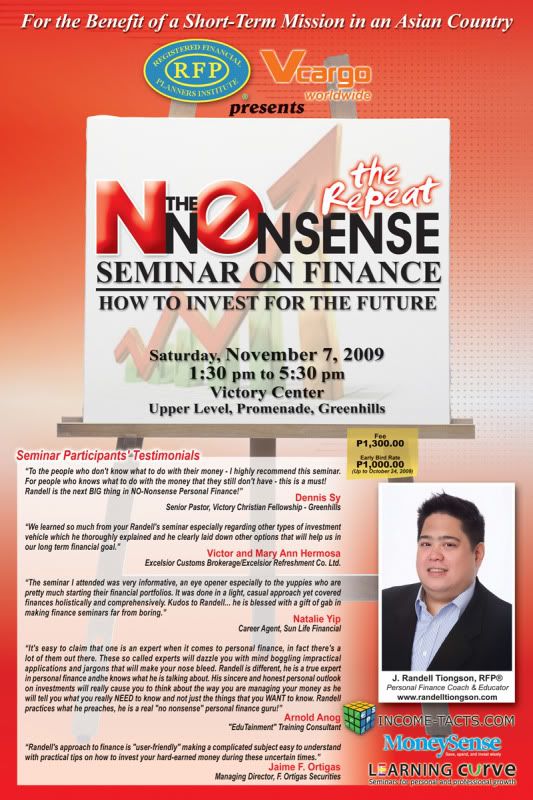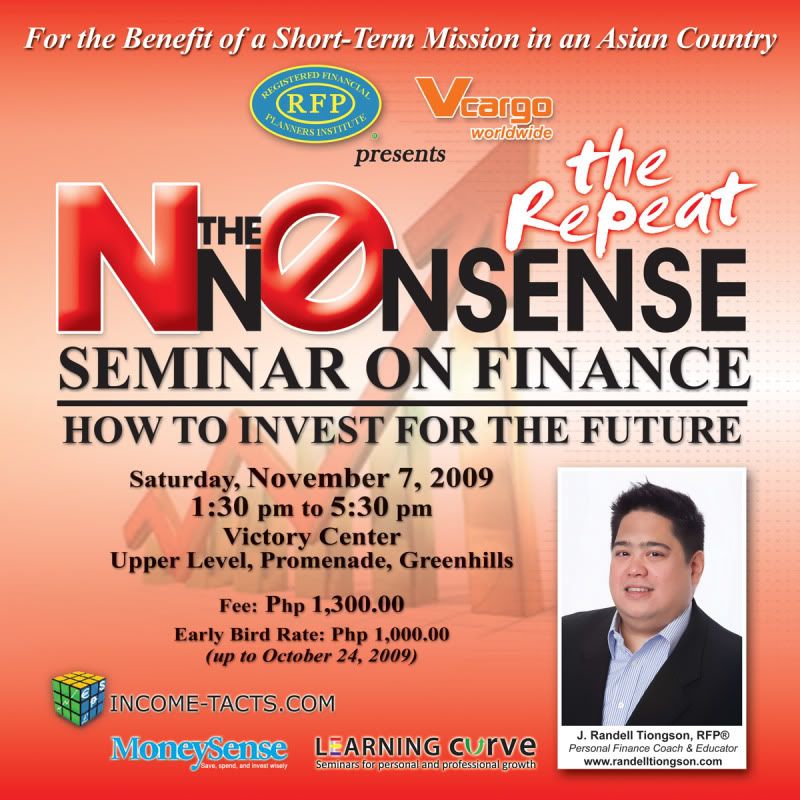The Tired, the Retired, and the Re-Tired
By Randell Tiongson on November 19th, 2009
Here is a nice blog written by my good friend Edmund Lao. Edmund is a Registered Financial Planner and and advocate of financial literacy for Pinoys. Excellent piece, a must read. — Randell
————————————-

GUEST BLOG
The Tired, the Retired, and the Re-Tired
By Edmund Lao
Have you ever heard employees say that they feel sick and tired of being sick and tired? The reason they feel this way is because they have been doing the same thing over and over for years and they are still the in the same situation the day they entered the corporate world. This situation is analogous to a person running on a treadmill. No matter how long the distance shown in the odometer, he is still on the same spot. Such is the predicament of the present day employees. Sadly but with truth, Robert Kiyosaki said that all employees are in a rat race. In a rat race, employees never get rich no matter how much they tire themselves. It is because all they know is to earn income that is directly proportional to the effort they exert. They did not learn and put into practice the methodology to increase their income passively after earning it actively. If they were able to build their wealth during their productive years, they would be able to enjoy the fruit of their labor during their golden years. In any thing that we do, we always feel relieved and indefatigable after we had achieved our target. With building our finances, for sure we would have felt the same. The only time we feel tired and frustrated is when we realize that all our effort were all spent in vain. That is how employees feel today, No matter how hard they strive, they could not make both ends meet and are always deep in debt. They always look for loan and then they work hard to be able to pay their balance due, then get a new loan again, and the cycle repeats. That is the life of the tired employees.
The Retired
For majority, retirement means the end of their corporate life. There are some who felt a sense of insecurity. On the other hand, there are some who felt they are finally granted independence from their voluntary prison cell of twenty to thirty years. They also see this as opportunity to build their own business.
A lot of people mistakenly correlate retirement with age when in fact, retirement has something to do with personal net worth and cash flow. The sooner a person reaches his financial goals, the sooner he can retire and enjoy life. Normally, employees are retired by age 55 or 60, and assuming they have served quite a number of years, say 25 years, some enjoy the benefit of a big amount of retirement pay.
I have heard of a company that paid almost five million pesos retirement benefit to an employee after 30 years of qualified service. So to those people who regularly transfer from one company to another, it is advisable for them to do the math first before making a decision. The problem that is often encountered come retirement day is that the retiree was not qualified to the retirement pay due to limited tenure of service. Then the only source of retirement income he will receive is from SSS. Jokingly, it can be termed as Living On SSS or LOSSS (rhymes with loss).
On the other hand, the retiree who received a huge amount may want to reward himself after working hard for so long that he carelessly spent or invested all his retirement funds. His has the risk of outliving his fund and when that happens, he will be in the same shoe with that of the one who retired broke. It is not a bad idea to reward one’s self, but he has to be very careful in controlling his emotion specially the excitement of a spending spree.
The Re-tired
What if the retiree became broke after retirement? The usual thing to do is to go to his favorite orphanage institution, his children. He will now experience reality. The time he has abundance, he was the asset and favorite “visitor” of his loved ones. With his present situation, he is now an overstaying liability especially to his sons/daughters-in law. If he has wealthy children, then luck is on his side. Otherwise, he can be compared to a basketball since he will be passed on from one son to another. The former good provider to his children is now a burden to them. The children become “sandwiched” since they have to support their own children and now, their aged parents.
With this kind of scenario, the once happily retired person, out of shame, has no other option but to return to the corporate world to get rehired again (if ever he succeeds considering the competition in job hunting nowadays) and do the things a tired employee does. He is what we can call the re-tired employee because he will just duplicate what he has done as a tired employee.
Solution
From being tired to being re-tired, we can see there is a common denominator, money. Out of desperation, some opt to doing part time work other than the regular job. There are those who voluntarily work overtime as needed. Worse, there are some who resort to theft of time and money from their company. This is a common problem in the workplace.
Employees complain of inadequate pay but they do not realize that it is their lifestyle that has a bearing on their personal finance. Their lifestyle reflects a “living beyond their means” and “keeping up with the Joneses” principle.
The key is to be frugal, budget by reducing unwanted expenses, and most importantly, pay forward so that later, the retired no longer needs to be re-tired.
In order to achieve that, a correct money attitude is a must. Money is just a tool and we are the ones who should manipulate it. Early on, acquire a good habit of disciplined savings regardless of the amount.
That way, there will be a possibility that your accumulated fund may outlive you. In that case, you have the opportunity to leave a legacy to your family.
Allow me to end this article by quoting the Proverbs:
Proverbs 13:11 “Dishonest money will dwindle, but money gathered little by little will surely grow.”
Proverbs 13:22. “A good man leaves an inheritance to his children’s children”
Special thanks to my very good friend, Engr Rudy Calingo of Metrobank Head Office, General Service Groups, for coming up with the title of this article.
Who Can Afford Education Nowadays? (part 2)
By Randell Tiongson on October 28th, 2009
… con’t.
So what’s the problem with the pressures of education? Well, if we put nearly all our resources in it, we tend to neglect other things that are important, such as retirement. Let me use myself as an example. I have four kids. If I opt to send all of them to über-expensive schools at our current income level, I will not only neglect our retirement, I will be broke. My wife and I will not have resources to be able live a quality life after our kids leave the nest. As my youngest graduates, I will be retired. The pressures of financing their education will drain us to a point that as soon as I retire, my wife and I will be dependents. The question is, dependent on whom? Our kids? Isn’t that unfair to them? With the pressures of surviving, it will be severely difficult for them to take care of us while making a life for themselves. Isn’t that very irresponsible of me and my wife, as well?
Solution? Well, priorities and common sense. Yes, education is our priority as parents, but so is preparing for our own future. Let us not sacrifice our future in the guise of education. Look for balance, there are many other practical solutions. Look for schools that offer quality education without the hefty price tag. The success of a child does not come from the school but from the home. One study proved parents, grandparents and other older members of the family are better tutors than those expensive tutors or tutorial schools.
Another practical suggestion: Home School. If done properly, home schooling can help children fare better in life compared with those who went to expensive schools. Both husband and wife need to work to make ends meet; with educational costs taking a drain, it may make more sense if the wife stays home and home- schools the kids. Most mothers I speak to will often tell me that had it not been for financial pressures, they’d rather stay home and take care of their kids. Do the math: If you spend about P300,000 on education for all your kids and the mother makes just about P300,000, it is financially feasible to just home-school the kids.
Moms can take a job from the house or start a home business, as well, while taking care of kids, including their education. Fathers can help too; there are many things husbands should be doing to help wives—taking care of the kids should be up there especially when you decide to try home schooling. There are many good Department of Education-accredited home-school programs around at a fraction of the cost of normal big-school education. I’ve met a lot of home schooled kids who are doing great – smart, grounded, has great values and strong leadership. There are many successful stories around. CCF and Victory Christian Fellowship have really good home-school programs. They also have regular interactive programs that allow home-school kids to interact with each other. Imagine the savings if you home-school your kids. . . better yet, invest the money you saved from education and see it grow. . . . You will have more than enough for your retirement, for health care—with some extra to leave for your kids. Set aside part of the savings for their college education, as well, and invest it well. I guess I’ll do a follow-up article on tips on investing for the education of our kids. You can get many practical tips from http://www.income-tacts.com/ on educational investing.
Well, I did mention that I still have two more kids, Riggs and Chino, my wife and I are now home schooling them. I am sure we will be better teachers to our own children. . . so will you. Our decision to home-school our boys will allow us time to properly take care of our daughters’ college education. . . prepare for the boys’ colleges, save for retirement and hopefully enjoy quality living. It’s not good to worry, but it’s great to plan.
Train a child in the way he should go, and when he is old he will not turn from it. (Proverbs 22:6, NIV)

Who Can Afford Education Nowadays? (part 1)
By Randell Tiongson on October 27th, 2009

People say that it is quite a challenge to send our kids to school nowadays and I agree 100%!
Just how difficult is it? About 14 years ago, our eldest daughter Billie entered preschool. I can still remember her anxiety. . . how she didn’t want to be left alone in school and how she clung to her mom’s legs so tightly out of fear of her new environment. . . great memories indeed. Two years later, our second daughter Gabbie had a different experience. . . she didn’t have the fears of her ate and entered the school like a very confident little girl.
Aside from their first-day school experiences, I also remembered their tuition. My first child’s Kinder 1 tuition at her school was about P35,000, and my second daughter’s slightly increased to about P38,000. Today, me eldest daughter’s tuition is now about P 195,000 a year while my second daughter’s tuition is about P 105,000 – that’s a whopping 457% and a 176% increase respectively in a span of over a decade. These figures are not inclusive of books, uniforms, etc. — just tuition! By the way, I don’t have just 2 kids, I also have 2 more sons.
Our concern has always been about providing for our children’s educational costs and after sending kids to schools for over a decade, it doesn’t get any easier.
It’s all about priorities. Filipino parents are so admirable that they move heaven and earth just to send their kids to school. They labor, they sacrifice. . . . It is not uncommon to find deserving students in expensive schools even if their parents can’t really afford it. While that is indeed an admirable trait, it is also a big concern. Why? Many parents pour everything they have into their children’s education without really planning for themselves. The result? They will be dependent on their children in the future, an offshoot of putting everything in the education of their kids.
This is a very controversial argument. It is every parent’s concern and priority to provide for their children, education being one of them. I am not saying that parents forfeit this obligation; on the contrary, I often coach parents on how to properly prepare for education costs. But parents must put things in their proper perspective. The ability to provide for their kids’ education is commensurate with their ability to put their financial life in order. We can’t sacrifice quality living and preparation for the future in the name of our kids’ education. When it comes to expensive education, I often say “go!”, but just make sure you can truly afford it. There are preschools today that cost P200,000 or more. The sprouting of “international” schools that charge outrageous tuition is an indication of how we put value on education. I often ask myself if sending my kids to expensive schools is really worth it. Often, our finances are so drained because of education that we tend to sacrifice other areas like retirement planning, investments, etc.
Is expensive tuition really worth it? Is quality education really all about expensive schools? How much money do we spend on private tutors? We live in a culture that encourages sending our kids to schools—at a price we can hardly afford that it puts too much pressure on us parents. Sacrificing for our children’s future is admirable, and I agree with that 100 percent. But I disagree with putting our children’s hopes solely on educational institutions. Being a training professional myself, I know that the ability to teach people is not just about good teachers, materials and facilities. It’s really more than that.
Honestly, did we really use what we learned in college when we started to work? Probably for doctors, dentists, lawyers. . . but for the rest of us? Hmm. Did school really prepare us for life? Do expensive, exclusive schools increase the chances of success? There really is no way for us to validate these arguments, but there is something I am sure about. Not having gone to expensive schools will not prevent a person from being successful. How many successful people did not go to an expensive university? A lot! I often check out many executives and successful entrepreneurs for their educational background. There are just as many successful people who did not go to an expensive school as those who did.
Catch part 2 of this blog, soon!






